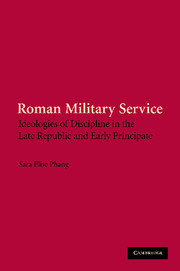Book contents
- Frontmatter
- Contents
- Preface and Acknowledgments
- Abbreviations
- General Introduction
- 1 Theorizing Disciplina: Social Conflict, Legitimation, and Power
- 2 Combat Training and Discipline
- 3 Viri Militares: Habitus and Discipline
- 4 Disciplina and Punishment
- 5 Disciplining Wealth: The Ideologies of Stipendia and Donativa
- 6 Labor Militaris: Work as Discipline
- 7 Feasts of Mass Destruction: Disciplina and Austerity
- General Conclusion
- Bibliography
- Index
2 - Combat Training and Discipline
Published online by Cambridge University Press: 27 July 2009
- Frontmatter
- Contents
- Preface and Acknowledgments
- Abbreviations
- General Introduction
- 1 Theorizing Disciplina: Social Conflict, Legitimation, and Power
- 2 Combat Training and Discipline
- 3 Viri Militares: Habitus and Discipline
- 4 Disciplina and Punishment
- 5 Disciplining Wealth: The Ideologies of Stipendia and Donativa
- 6 Labor Militaris: Work as Discipline
- 7 Feasts of Mass Destruction: Disciplina and Austerity
- General Conclusion
- Bibliography
- Index
Summary
combat training was an important element of Roman disciplina militaris. Soldiers acquired and maintained physical fitness and combat skills by training to fight with swords, javelins, and other weapons; marching long distances; and carrying out mass exercises and simulated campaigns. The training of soldiers was not fully rationalized in the Weberian sense. The sources do not emphasize a discrete period of training such as modern basic training or boot camp; training was ideally ongoing and was the responsibility of individual commanders. Such responsibility was still emphasized in the imperial period, though inscriptions show that low-ranking officers specialized as trainers. Some emperors adopted a highly visible role in overseeing training.
Combat training emphasized individual physical fitness and endurance and combat skills: technique, speed, agility, accuracy, and aggression. Virtus, courage or prowess demonstrated in combat, was the objective of training. Group maneuvers in formation, marches, and mock battles were also taught. However, the need to maintain ranks (ordines servare) in battle competed with the prestige of prowess in hand-to-hand combat with the enemy.
Soldiers who were well trained demonstrated a high degree of animus (confidence, morale) and impetus (onslaught, energy) in combat. These qualities, deployed against Roman citizens in periods of civil war, were hard to distinguish from furor (madness) and ira (rage). The aristocracy regarded the aggressiveness of soldiers as a double-edged sword.
Mass drill rationalized and legitimated professional armies in seventeenth-, eighteenth-, and nineteenth-century Europe, serving as a method of social control and a spectacle of national power.
- Type
- Chapter
- Information
- Roman Military ServiceIdeologies of Discipline in the Late Republic and Early Principate, pp. 37 - 72Publisher: Cambridge University PressPrint publication year: 2008



